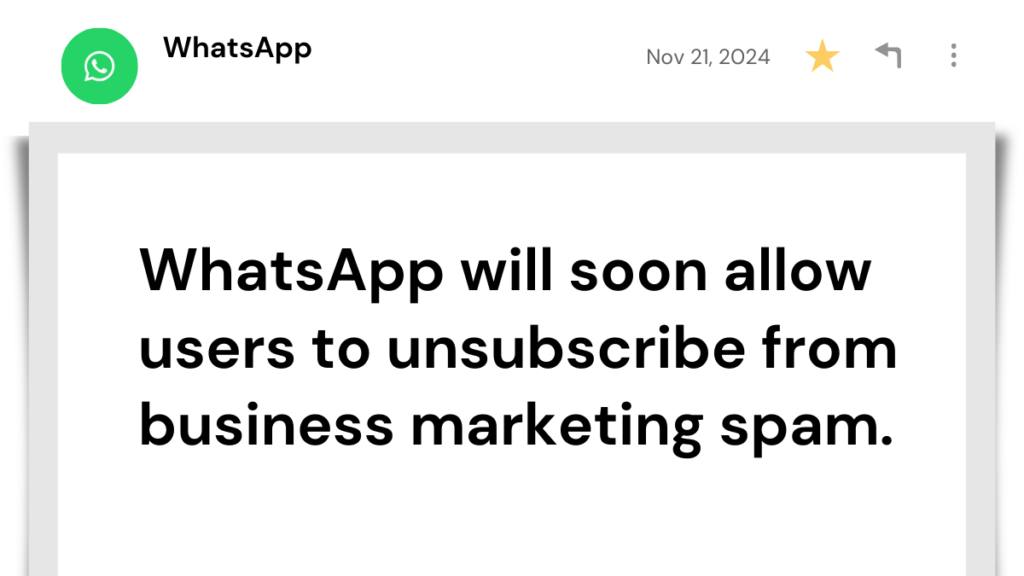WhatsApp Business has grown to more than 200 million monthly users in recent years.
WhatsApp will finally let you unsubscribe from business marketing spam!
WhatsApp Business has experienced significant growth, surpassing 200 million monthly users in recent years. This surge indicates that numerous businesses are actively communicating with users, leading to the potential for some messages to be perceived as spam. Previously, customers had limited choices: they could either allow businesses to send messages and promotions or block the business account entirely. However, WhatsApp is now implementing changes to address this issue.
The company is currently testing new mechanisms that enable users to give feedback to businesses regarding the types of messages they wish to receive or avoid. This initiative includes options such as “interested/not interested” and “stop/resume” for specific message categories.
Meta has announced plans to conduct global testing of these interactions. For instance, users will be able to express their interest in receiving “offers and announcements” through a simple interface. Additionally, they will have the option to completely halt these types of messages. In the future, users may also choose to resume receiving messages from a brand during special occasions if they wish. Businesses will be able to communicate via WhatsApp’s API across four defined categories: marketing (offers, new products), utility (order updates, account balance), authentication (one-time passwords), and service (customer inquiries).
While these categories have been established in the backend, customers previously lacked the ability to selectively stop one type of message while continuing to receive others. For example, a user might want to receive updates on purchases and authentication codes from an e-commerce platform but would have no means to opt out of marketing messages without blocking all communications.
In nations such as India and Brazil, a phone number linked to WhatsApp serves as the primary means of communication for numerous users, in contrast to email. While email provides an option to unsubscribe from promotional messages, WhatsApp lacks similar features, leading to users being inundated with unsolicited business communications.
The company is contemplating the implementation of new controls for business messaging. During a discussion with TechCrunch in September, held alongside a WhatsApp Business event in India, Nikila Srinivasan, Vice President of Product Management for Messaging Monetization at Meta, alluded to this potential feature. She emphasized the importance of transparency in user interactions with businesses, stating that if users prefer not to engage, the most effective action is to block and report those businesses. This feedback assists the platform in recognizing which businesses users do not wish to interact with. Furthermore, she noted that the company is exploring ways to provide users with more options to express their preferences in a more detailed manner.
Srinivasan also highlighted the significance of educating businesses about how certain campaigns may not align with the platform’s standards or user expectations, which could ultimately lead to a decrease in spam.
Earlier this year, the company began to limit the number of marketing messages an individual can receive daily, although the specific limit has not been disclosed. Historically, WhatsApp has positioned itself as a platform for personal conversations. However, in recent years, it has introduced features that allow users to create and join communities, broadcast messages as creators or publishers, and enable businesses to communicate directly with customers. Both communities and broadcast channels are now accessible through dedicated tabs within the application.
Business communication continues to appear in the primary chat inbox, and currently, there is no option to filter these messages. During its Q3 2024 earnings call, the company highlighted that the WhatsApp Business platform serves as a significant growth catalyst for the revenue generated by its suite of applications, which totaled $434 million for the quarter. The organization must strike a balance between generating revenue and avoiding the alienation of core WhatsApp users by overwhelming them with business-related messages.
When inquiring about this balance and the potential for establishing a distinct area for business communications, Srinivasan noted that many of the recent WhatsApp features are optional and distinct from the main inbox.
“The essence of using WhatsApp is to engage with your inbox. When considering the possibility of creating a separate experience for businesses, I find great inspiration in our efforts to support businesses. Our initiatives aimed at educating businesses and enhancing user controls are driven by our desire to maintain a high standard for what is appropriate in your inbox,” she stated.
